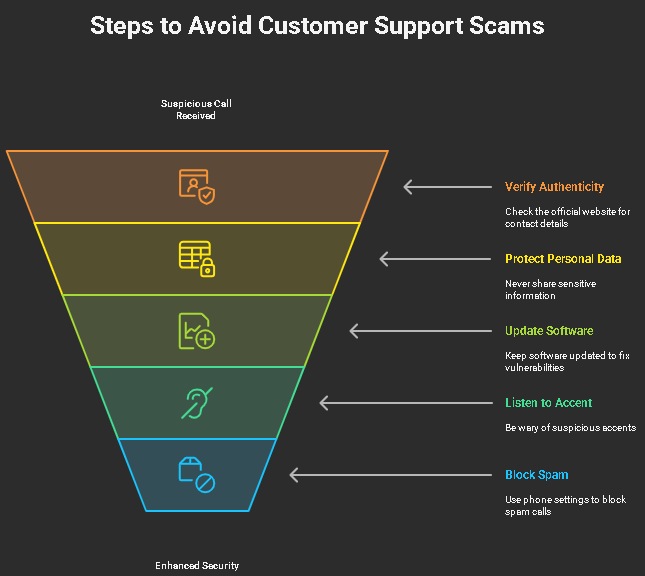Fake customer care service scam may cost you your fortune!
If you think that a poor customer support system is the biggest nuisance ever, then you need to see this!
A bogus customer service scam is doing the rounds in the US where a cybercrook demands your credit card details, then and there, as you try to connect with the genuine customer support system. These scams are more common during queries where passengers attempt to contact the customer support team to inquire about flight delays, cancellations, lost luggage, and other issues.
These cybercriminals are clever enough to capitalize on the sense of urgency the victim is experiencing. They easily plan false customer service numbers on search engine results. You will be surprised to know how they have managed to create fake customer support details for some of the major insurance companies, online retailers, airlines, and banks.
Amazon customer care scam
In March 2025, the popular e-commerce platform Amazon informed its global audience on X about a 33% rise in customer support impersonation scams. The scamsters have been targeting innocent and unaware Amazon customers since December 2024. Such warnings serve as a stark reminder that customers should exercise extreme caution when posting complaints about Amazon products on social media.
Threat actors closely monitor such customer complaints and then contact you through fake accounts. They are too good at social engineering skills and might convince you to click on malicious links or share personal details.
They have the resources and the expertise to impersonate genuine customer support systems. Amy Nofziger, AARP Fraud Watch Network’s director of victim support, agrees that it is best to go the conventional way to launch a complaint with a company or brand. Posting it online to gain attention can be a risky move, as scammers can see those posts.
They notice your frustration, understand the minute details through your post, and then use the same to earn your trust. She focused on how the AARP’s toll-free helpline receives multiple calls about customer service scams. They have also put up a bulletin warning people against similar scam activities.
Social media platforms like X, Reddit, Instagram, and PissedConsumer are quite popular among consumers for ranting against certain products or services to grab the attention of brand owners. However, cybercriminals can easily identify those posts and target victims when they are at their most vulnerable.
How to identify if you are talking to a threat actor instead of a genuine customer care executive?
Here are some common patterns of a scammer that you can track if you pay attention to the communication style. Notice if they are asking for money up front. Or see if they are trying to scare you by creating some stories around your money getting stolen. They may also talk about fake money laundering investigations. Another red flag is that they may coerce you to pay a certain bill by using your American Express gift card to enjoy a particular discount.
Most of these threat actors impersonate customer support systems of major brands, such as eBay, Amazon, Wells Fargo, and Geico.
Sometimes, even Google can land you in trouble!
If you are planning to search the contact details of a particular company’s customer support system, you may land in trouble. You may see a number on Google SERPs and assume it to be the genuine number, as it appears on Google. But this mistake has already cost $250 a Michigan-based consumer.
The numbers that you see at the top of the search engine results page may be entirely fake. Whenever you use such a number to connect with a customer care executive, make sure that the URLs are genuine. Pay attention to the meta title, meta description, as well as the URL before clicking on the link. If you find any spelling mistakes or linguistic errors, avoid using that number at all costs.
Dos and don’ts to avoid bogus customer support scams
Experts urge users to stay cautious and practice cyber hygiene whenever they get a call from customer support centers:
- If you have the slightest of doubts, hang up the call and visit the official website of that company. Dial the customer care number that you see there.
- Always remember that a genuine customer care executive will never ask for sensitive personal details such as your CVV number or password. Sharing such information can put you at serious risk of identity theft or a data breach. To protect yourself, be cautious and verify the authenticity of any request before disclosing personal data.
- Another great move is to keep your software updated on a regular basis. This fixes the patch vulnerabilities and makes it difficult for threat actors.
- Pay attention to the accent of the caller. If it sounds suspicious, trust your instincts and hang up the call.
- Use your smartphone’s settings to block spam and unknown callers.
Customer care systems are designed to offer convenience and support to consumers. However, it’s crucial for users to remain cautious, as scammers often exploit these systems to carry out phishing attacks. Staying alert and practicing strong phishing protection measures—like verifying sources before sharing personal information—is essential. Most importantly, consumers should understand that social media is not the solution to all their problems and may even increase vulnerability if misused.






